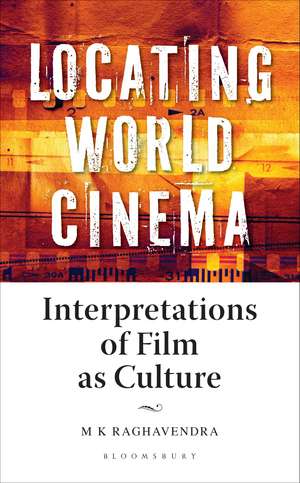Locating World Cinema: Interpretations of Film as Culture
Autor M. K. Raghavendraen Limba Engleză Hardback – 17 mar 2020
Preț: 510.71 lei
Preț vechi: 731.39 lei
-30% Nou
Puncte Express: 766
Preț estimativ în valută:
97.72€ • 102.04$ • 80.70£
97.72€ • 102.04$ • 80.70£
Carte disponibilă
Livrare economică 25 martie-08 aprilie
Preluare comenzi: 021 569.72.76
Specificații
ISBN-13: 9789389714203
ISBN-10: 9389714206
Pagini: 320
Dimensiuni: 135 x 216 mm
Greutate: 0.52 kg
Editura: Bloomsbury Publishing
Colecția Bloomsbury Academic India
Locul publicării:New Delhi, India
ISBN-10: 9389714206
Pagini: 320
Dimensiuni: 135 x 216 mm
Greutate: 0.52 kg
Editura: Bloomsbury Publishing
Colecția Bloomsbury Academic India
Locul publicării:New Delhi, India
Caracteristici
It examines a wide range of cinema (Soviet/Russian cinema, the global art film) and filmmakers comprehensively, some considered 'difficult' by audiences, like Robert Bresson, Aleksei German, Jacques Rivette, Kenji Mizoguchi and offers lucid and original interpretations of representative bodies of films.
Notă biografică
MK Raghavendra is an Indian film critic. He received the National Award for Best Film Critic in 1997. He has authored three volumes of academic film criticism - Seduced by the Familiar: Narration and Meaning in Indian Popular Cinema (Oxford, 2008), Bipolar Identity: Region, Nation and the Kannada Language Film (Oxford, 2011) and The Politics of Hindi Cinema in the New Millennium: Bollywood and the Anglophone Indian Nation (Oxford, 2014). He has also written two books on cinema for the general reader 50 Indian Film Classics (Collins, 2009) and Director's Cut: 50 Film-makers of the Modern Era (Collins, 2013) and edited an anthology of writing on South-Indian cinema, published by HarperCollins in 2017, Beyond Bollywood: The Cinemas of South India. His book The Oxford Short Introduction to Bollywood was published in 2016. His academic writings have been anthologized in books published by Oxford University Press, SAGE, Routledge, BFI (British Film Institute). He is a member of FIPRESCI and has been on the juries of several international film festivals including East-West: The Golden Arch, 2018 and 2019.
Cuprins
Introduction: Between Meaning and Significance 1. The Engineered Look: The Film Festival Circuit and the Aesthetics of the Global Art Film 2. A Fallible Tradition: Kenji Mizoguchi and the Post-War Transformation of Japan 3. World and Text: Interpreting Jacques Rivette4. Unattainable Women: Sexual Anxiety and Location- Scorsese, Rohmer and Kiarostami 5. Beyond Religion: The Spiritual Cinema of Robert Bresson 6. Nation and Transgression: Ideology and the Horror Film in India and Pakistan 7. A Trajectory of Form: The Development of Soviet/Russian Cinema (1910-2010)8. History as Polyphony: Understanding Aleksei German 9. Utopia and the Patriarchal Order: Zhang Yimou as a Chinese National ArtistBibliography Film IndexIndex About the Author
